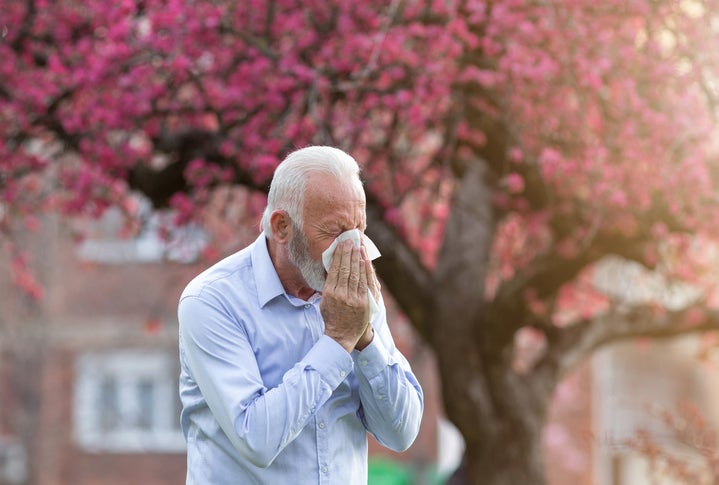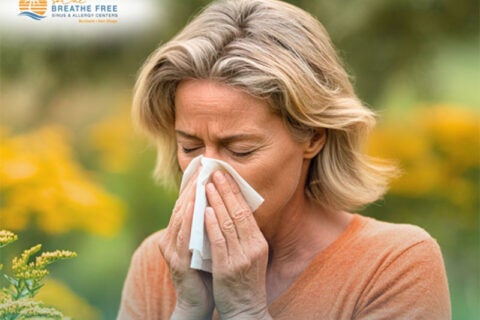Tips to Minimize the Effects of Seasonal Allergies
Few Tips to Minimize the Effects of Seasonal Allergies
Seasonal allergies, also known as hay fever or allergic rhinitis, can leave you feeling miserable with symptoms like sneezing, nasal congestion, itchy eyes, and fatigue. Thankfully, you don’t have to suffer endlessly when allergy season arrives. By adopting the right strategies, you can better manage your symptoms and enjoy a more comfortable daily life. These five tips may help reduce the effects of seasonal allergies and support more effective symptom management.
Below, the ENT providers at SoCal Breathe Free Sinus & Allergy Centers San Diego include some helpful tips about managing and minimizing the effects of seasonal allergies for patients throughout San Diego, CA and the surrounding areas, including Burbank. Reach out to our friendly team today to learn more about seasonal allergy treatment.

-
Track Pollen Counts & Plan Accordingly
Pollen is one of the primary triggers of allergic conditions, making it essential to stay informed about pollen levels during allergy season. Websites, apps, and local weather forecasts often provide daily pollen counts. High pollen days are often the worst for allergy sufferers, so planning your activities accordingly can save you from unnecessary seasonal allergies symptoms. If pollen levels are high, consider spending more time indoors, especially during peak hours when pollen counts are at their highest (usually early morning and late afternoon).
-
Improve Indoor Air Quality
The air inside your home could be a hidden source of discomfort if allergens like pollen, dust, or pet dander get inside. Improving your indoor air quality is a crucial step in reducing the impact of seasonal allergies. Here’s how to allergy-proof your home:
- Use a high-quality HEPA filter in your HVAC system to trap airborne irritants.
- Invest in an air purifier to further eliminate allergens floating in the air.
- Keep windows closed during high-pollen periods to block pollen from entering your home.
- Clean and vacuum regularly, preferably with a vacuum cleaner equipped with a HEPA filter.
Maintaining proper humidity levels with a dehumidifier can also prevent mold growth, another common allergen. Creating a clean, allergen-free environment can provide much-needed relief when you can’t avoid staying inside.
-
Adopt Smart Outdoor Habits
Outdoor activities don’t have to be sacrificed entirely during allergy season—you must approach them with extra care. Start by scheduling outdoor tasks when pollen counts are lower, such as in the late evening. Avoid mowing the lawn, gardening, or doing yard work during peak times unless necessary. If you must, wear a mask to protect yourself from inhaling allergens. When you return indoors after spending time outside, take precautions to prevent allergens from spreading around your home. Changing clothes, washing your hands and face, and even showering as soon as you get inside can reduce the pollen you bring into your living space. These small outdoor habits can make a big difference in your overall comfort.
-
Change Your Bedtime Routine
Over-the-counter and prescription medications are among the most effective tools for managing seasonal allergies. Antihistamines can block your body’s allergic reaction, while decongestants alleviate nasal congestion. Nasal corticosteroid sprays are also a highly effective allergy treatment method. Beyond medications, certain natural remedies can complement your treatment plan. For example, saline nasal rinses help clear allergens and mucus from your nasal passages. Despite popular belief, local honey has not been proven effective in treating seasonal allergies. Rely on evidence-based treatments and consult your provider before exploring alternative remedies.
Always speak with a healthcare provider before trying unproven remedies, taking over-the-counter medications, or participating in allergy testing, especially if you already use medications. Using treatments wisely ensures that your symptoms stay manageable throughout allergy season.
-
Strengthen Your Immune System
A strong immune system can significantly affect how your body handles seasonal allergens. While you can’t prevent allergies entirely, supporting your immune health may reduce the severity of your symptoms. Focus on eating a nutrient-rich diet with plenty of fruits, vegetables, and foods high in antioxidants, like berries, spinach, and broccoli. Omega-3 fatty acids in fish, walnuts, and flaxseeds can also help reduce inflammation. Staying hydrated is equally important, as it thins mucus and helps your body function more effectively. Finally, make sleep a priority, as adequate rest strengthens immune defenses and helps your body recover from allergy flare-ups. A healthier immune system will make allergy season more bearable.
Frequently Asked Questions About Seasonal Allergies
Seasonal allergies can be complex to understand, especially when there are so many triggers and treatment options. Below, we answer some of the most common questions about seasonal allergies.
- How Long Do Seasonal Allergies Last?
Seasonal allergies can last anywhere from a few weeks to several months, depending on the time of year and the specific allergens involved. Understanding the duration of allergy seasons and managing symptoms effectively can help you get through these challenging periods.
- Can Seasonal Allergies Cause a Fever?
Seasonal allergies don’t directly cause a fever. They trigger symptoms like sneezing, congestion, and fatigue but not the elevated body temperature tied to fever. If you experience a fever alongside allergy-like symptoms, it could indicate an infection, such as a cold or sinusitis, rather than allergies alone.
- Can Seasonal Allergies Cause Shortness of Breath?
Seasonal allergies can cause nasal congestion and postnasal drip, making breathing harder. However, true shortness of breath may signal asthma or another serious condition commonly linked to allergies. A doctor should always evaluate persistent or severe breathing problems to determine the underlying cause and ensure proper treatment.
- Can Seasonal Allergies Cause a Sinus Infection?
Seasonal allergies can contribute to sinus infections by causing nasal inflammation and mucus buildup, creating an ideal environment for bacteria to grow. Although allergies don’t directly cause infections, unmanaged symptoms can increase the risk. Controlling allergens and treating nasal congestion promptly can help prevent secondary issues like sinus infections from developing.
Get Connected to Effective Seasonal Allergies Treatment Today
Seasonal allergies don’t have to ruin your spring, summer, or fall. Reach out to the team at SoCal Breathe Free Sinus & Allergy Centers San Diego if you’re ready to learn how to manage your symptoms more effectively or schedule an appointment online to get started. We’re happy to help residents throughout San Diego, CA and the surrounding areas, including Burbank.
The information provided in this article is for informational and educational purposes only and does not constitute medical advice. It is not intended to diagnose, treat, cure, or prevent any disease or medical condition. Always seek the guidance of your physician or other qualified healthcare provider with any questions you may have regarding a medical condition or treatment.
Results may vary: Treatment outcomes and health experiences may differ based on individual medical history, condition severity, and response to care.
Emergency Notice: If you are experiencing a medical emergency, call 911 or seek immediate medical attention.

